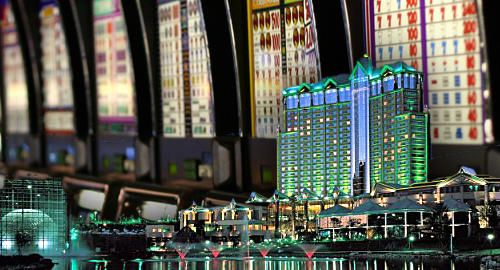 South Korea’s largest casino Kangwon Land is under fire for alleged favoritism the state-run operator is showing certain electronic gaming machine (EGM) suppliers.
South Korea’s largest casino Kangwon Land is under fire for alleged favoritism the state-run operator is showing certain electronic gaming machine (EGM) suppliers.
On Thursday, the Korea Times quoted People Power Party Rep. Ku Ja-keun saying three companies – Taeshin Inpack, Nongshim Data System Corp (NDS) and KGS – had claimed over half of the EGM supply contracts for Kangwon Land since 2013, even though some of those contract were awarded despite apparent violations of the tender process.
Taeshin Inpack is a subsidiary of cosmetics firm AmorePacific, whose chairman Suh Kyung-bae is the son-in-law of NDS chairman Shin Chun-ho. Suh is also cousin to the heads of both Taeshin and KGS. The three companies have bid on Kangwon Land contracts both separately and as a consortium, the latter winning three of four bids over the past two years.
Rep. Ku is calling for a probe of Kangwon Land’s procurement process based on certain irregularities in the three EGM suppliers’ bids. NDS won an electronic table games tender despite submitting its bid after the July 22 deadline. Kangwon Land also agreed to ignore a stipulation that the casino gear include a ‘roll-back’ feature, something the NDS gear claimed to offer but didn’t.
Pulse News quoted Ku saying that Kangwon Land also allowed NDS to make changes to its bid for a KRW3b (US$2.6m) contract. The casino reportedly reviewed the NDS bid in advance of the deadline and requested supplementary documentation, violating a clause that required all bids to be opened simultaneously.
Kangwon Land has denied showing any favoritism to any supplier, while also denying that it was picking winning bids based on any pressure from its government bosses. It remains to be seen whether this story will have any legs or will simply be written off as an opposition party member finding a new way to gripe about the government.
Kangwon Land, the only South Korean casino at which local residents are allowed to gamble, generates annual sales that surpass the combined revenue of the nation’s 16 foreigner-only casinos. But this privilege comes with serious strings, including stricter oversight of its operations and whether its customers are suitably protected from potential gambling harm.
Those concerns also kept Kangwon Land closed longer due to COVID-19 than its foreigner-only rivals. The casino opened its mass gaming floor last week for the first time since it was forced to close in February due to the COVID-19 pandemic. The casino briefly revived its VIP gambling operations in May but was forced to shut down again in August as the nation suffered a second wave of infections.
GRAND KOREA LEISURE A BAD BET
Grand Korea Leisure (GKL), which operates three foreigner-only casinos under its Seven Luck brand, has struggled not only with its own pandemic shutdowns but also the shutting of South Korea’s borders, which has deprived GKL of the international customers it needs to survive.
GKL, which like Kangwon Land is state-owned, reported September sales of just KRW9.4b (US$8m), down 76.5% from the same month last year and around one-quarter below August 2020’s sales. For the year-to-date, GKL’s sales are off 53% to KRW169.4b from the first nine months of 2019.
Analysts at Hyundai Motor Securities recently projected that GKL’s Q4 sales will come in around KRW48b, about two-thirds of Q4 2019’s sales. With no sign that South Korea’s border restrictions will loosen anytime soon, and China increasingly antagonistic toward any of its citizens traveling abroad for gambling purposes, GKL may require its government sugar-daddies to step in sooner rather than later.